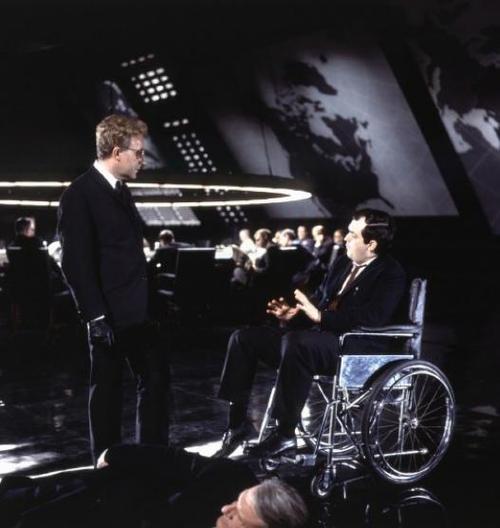Excerpts from two articles about Dr. Strangelove or: How I Learned to Stop Worrying and Love the Bomb, which is one of the greatest films ever made, yet only my fourth or fifth favorite Stanley Kubrick movie, which shows you how highly I rank his work. It’s as perfect now as it was when released 50 years ago, as timeless as Patton or Duck Soup. In fact, it’s Patton *as* Duck Soup. It’s tremendously funny yet no laughing matter.
_________________________
From “Doctor’s Orders,” Bilge Elbiri’s 2009 Moving Image Source article explaining how a very serious novel became a Kubrick comedy:
After their initial drafts, Kubrick and his producing partner James B. Harris, with whom he had made The Killing, Paths of Glory, and Lolita, workshopped the script (then called The Delicate Balance of Terror) in New York. “They’d stay up late into the night cracking up over it, overcome by their impulse towards gallows humor,” says Mick Broderick, the author of Nuclear Movies and an extensive forthcoming study of Strangelove. Harris would soon leave to forge his own directorial career (his admirably tense 1965 directorial debut, The Bedford Incident, concerns a confrontation between an American destroyer and a Soviet submarine). But when Kubrick later called his former partner to tell him that he had decided to turn Delicate Balance into an actual comedy, Harris was skeptical, to say the least. “He thought, ‘The kid’s gonna destroy his career!’” says Broderick.
The absurd hilarity of the situation had never quite stopped haunting the director, as he and George continued to work on the film. It wasn’t so much the premise of the Red Alert story as everything Kubrick was learning about the thinking behind thermonuclear strategy. The director, even then notorious for thorough research, had become friendly with a number of scientists and thinkers on the subject, some with George’s help, including the notorious RAND strategist Herman Kahn, who would talk with a straight face about “megadeaths,” a word he had coined in the 1950s to describe one million deaths. As Kubrick told Joseph Heller:
Incongruity is certainly one of the sources of laughter—the incongruity of sitting in a room talking to somebody who has a big chart on the wall that says “tragic but distinguishable postwar environments’ and that says ‘one to ten million killed.” …There is something so absurd and unreal about what you’re talking about that it’s almost impossible to take it seriously.•
_________________________
From “Almost Everything in Dr. Strangelove Was True,” a New Yorker blog post about the scary reality that informed the nervous laughter, by Eric Schlosser, author of Command and Control:
This month marks the fiftieth anniversary of Stanley Kubrick’s black comedy about nuclear weapons, Dr. Strangelove or: How I Learned to Stop Worrying and Love the Bomb. Released on January 29, 1964, the film caused a good deal of controversy. Its plot suggested that a mentally deranged American general could order a nuclear attack on the Soviet Union, without consulting the President. One reviewer described the film as “dangerous … an evil thing about an evil thing.” Another compared it to Soviet propaganda. Although Strangelove was clearly a farce, with the comedian Peter Sellers playing three roles, it was criticized for being implausible. An expert at the Institute for Strategic Studies called the events in the film “impossible on a dozen counts.” A former Deputy Secretary of Defense dismissed the idea that someone could authorize the use of a nuclear weapon without the President’s approval: “Nothing, in fact, could be further from the truth.” (See a compendium of clips from the film.) When Fail-Safe—a Hollywood thriller with a similar plot, directed by Sidney Lumet—opened, later that year, it was criticized in much the same way. “The incidents in Fail-Safe are deliberate lies!” General Curtis LeMay, the Air Force chief of staff, said. “Nothing like that could happen.” The first casualty of every war is the truth—and the Cold War was no exception to that dictum. Half a century after Kubrick’s mad general, Jack D. Ripper, launched a nuclear strike on the Soviets to defend the purity of “our precious bodily fluids” from Communist subversion, we now know that American officers did indeed have the ability to start a Third World War on their own. And despite the introduction of rigorous safeguards in the years since then, the risk of an accidental or unauthorized nuclear detonation hasn’t been completely eliminated.•

